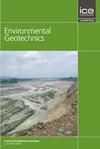降雨强度对滑坡起爆的影响:水槽试验与数值分析
IF 2.2
4区 工程技术
Q3 ENGINEERING, GEOLOGICAL
引用次数: 0
摘要
本文通过一系列水槽试验,探讨降雨强度对浅层滑坡发生的影响。采用粗粒材料建造边坡,并模拟了强度为40 mm/h、70 mm/h或100 mm/h的降雨事件,以引发边坡破坏。在坡面安装一套孔隙水压力和含水率传感器,监测每次试验过程中水分状况的变化。为了更好地了解降雨过程中水分对边坡稳定性的影响,采用5%和10%的土体初始含水量。结果表明,在70 mm/h和100 mm/h的强度下,边坡发生破坏;然而,当降雨强度为40 mm/h时,未观察到失效。破坏模式是相似的,随着更多的水渗入边坡,发生了渐进的滑动。提出了一种估算降雨事件期间安全系数的数值方法,并根据实验室数据进行了验证。数值分析得到的破坏时间与水槽试验中观察到的时间接近。本文章由计算机程序翻译,如有差异,请以英文原文为准。
Effect of Rainfall Intensity on Landslide Initiation: Flume Tests and Numerical Analysis
This paper seeks to investigate the effect of rainfall intensity on the occurrence of shallow landslides by means of a series of flume tests. Coarse-grained material was used to build a slope, and several rainfall events with an intensity of either 40 mm/h, 70 mm/h, or 100 mm/h were simulated to initiate slope failure. A set of pore water pressure and moisture content sensors was installed in the slope to monitor changes in the water conditions during each test. Different initial moisture contents of 5% and 10% of the soil mass were used to better understand the effect of moisture on slope stability during rainfall. It was found that the slope failed when intensities of 70 mm/h and 100 mm/h were used; however, no failure was observed with a rainfall intensity of 40 mm/h. The failure patterns were found to be similar, with progressive slides occurring as more water infiltrated the slope. A numerical procedure to estimate the factor of safety over the period of the rainfall event was proposed and validated against the laboratory data. The results of the numerical analysis yielded the failure time, which was close to the time observed in the flume tests.
求助全文
通过发布文献求助,成功后即可免费获取论文全文。
去求助
来源期刊

Environmental geotechnics
Environmental Science-Water Science and Technology
CiteScore
6.20
自引率
18.20%
发文量
53
期刊介绍:
In 21st century living, engineers and researchers need to deal with growing problems related to climate change, oil and water storage, handling, storage and disposal of toxic and hazardous wastes, remediation of contaminated sites, sustainable development and energy derived from the ground.
Environmental Geotechnics aims to disseminate knowledge and provides a fresh perspective regarding the basic concepts, theory, techniques and field applicability of innovative testing and analysis methodologies and engineering practices in geoenvironmental engineering.
The journal''s Editor in Chief is a Member of the Committee on Publication Ethics.
All relevant papers are carefully considered, vetted by a distinguished team of international experts and rapidly published. Full research papers, short communications and comprehensive review articles are published under the following broad subject categories:
geochemistry and geohydrology,
soil and rock physics, biological processes in soil, soil-atmosphere interaction,
electrical, electromagnetic and thermal characteristics of porous media,
waste management, utilization of wastes, multiphase science, landslide wasting,
soil and water conservation,
sensor development and applications,
the impact of climatic changes on geoenvironmental, geothermal/ground-source energy, carbon sequestration, oil and gas extraction techniques,
uncertainty, reliability and risk, monitoring and forensic geotechnics.
 求助内容:
求助内容: 应助结果提醒方式:
应助结果提醒方式:


